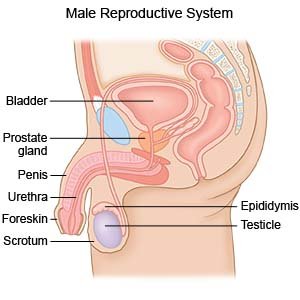Orchiectomy
Medically reviewed by Drugs.com. Last updated on Aug 4, 2025.
WHAT YOU NEED TO KNOW:
Orchiectomy, also called orchidectomy, is surgery to remove one or both of your testicles.
 |
HOW TO PREPARE:
The week before your surgery:
- Arrange to have someone drive you home after you are discharged from the hospital.
- Tell your surgeon about all medicines you currently take. He or she will tell you if you need to stop any medicine for surgery, and when to stop. He or she will tell you which medicines to take or not take on the day of surgery.
- If your sperm is healthy, you may be able to save a sample at a sperm bank. Ask your healthcare provider for more information about sperm banks.
- You may need to take certain medicines before your surgery. If you have an infection, you may need to take antibiotics. In some cases, such as cancer, you may need to take antihormone medicine. Antihormone medicine helps block the production of testosterone in your body and may slow tumor growth.
- You may need blood and urine tests. You may also need x-rays, a CT scan, MRI, or an ultrasound. Ask your healthcare provider for more information about these or other tests that you may need.
The night before your surgery:
You may be told not to eat or drink anything after midnight.
The day of your surgery:
- You or a close family member will be asked to sign a legal document called a consent form. It gives healthcare providers permission to do the procedure or surgery. It also explains the problems that may happen, and your choices. Make sure all your questions are answered before you sign this form.
- An IV will be placed in a vein. You may get medicines or liquid through the IV.
- An anesthesiologist will talk to you before your surgery. You may need medicine to keep you asleep or numb an area of your body during surgery. Tell healthcare providers if you or anyone in your family has had a problem with anesthesia in the past.
WHAT WILL HAPPEN:
What will happen:
Anesthesia will be given to keep you free from pain during your surgery. Your surgeon will make an incision in your scrotum. He or she will tie your spermatic cord and cut it just above your testicle. Then all or part of your testicle will be removed. A drain may be placed inside your skin to remove fluid from around your incision. Your incision will be closed with stitches and covered with a bandage. If only one of your testicles is removed, your surgeon may take a sample from the other testicle. Your testicles and other removed tissues may be sent to a lab for tests.
After your surgery:
You will be taken to a room where you will rest until you are fully awake. Healthcare providers will monitor you closely. Do not get out of bed until your healthcare provider says it is okay. When healthcare providers see that you are okay, you may be able to go home. If you are staying in the hospital, you will be taken to a hospital room.
CONTACT YOUR HEALTHCARE PROVIDER IF:
- You get sick with a cold or the flu.
- You have questions or concerns about your surgery.
Seek Care Immediately if
- You have severe pain in your testicles.
Risks
- You may bleed more than expected during surgery or get an infection. Blood may pool inside your scrotum. You may develop a life-threatening blood clot. Your scrotum may swell and become painful after your surgery.
- If you have both testicles removed, you may have symptoms of decreased male hormone levels. Low male hormone levels may cause decreased sexual desire, erection problems, a smaller penis, and enlarged breasts. You may have weight gain, hot flashes, a dry mouth, and mood changes. Your bones may become weak, and you may have decreased muscle mass. Decreased male hormones may also make you unable to get your female partner pregnant.
Related medications
Care Agreement
You have the right to help plan your care. Learn about your health condition and how it may be treated. Discuss treatment options with your healthcare providers to decide what care you want to receive. You always have the right to refuse treatment.© Copyright Merative 2025 Information is for End User's use only and may not be sold, redistributed or otherwise used for commercial purposes.
The above information is an educational aid only. It is not intended as medical advice for individual conditions or treatments. Talk to your doctor, nurse or pharmacist before following any medical regimen to see if it is safe and effective for you.
Further information
Always consult your healthcare provider to ensure the information displayed on this page applies to your personal circumstances.
